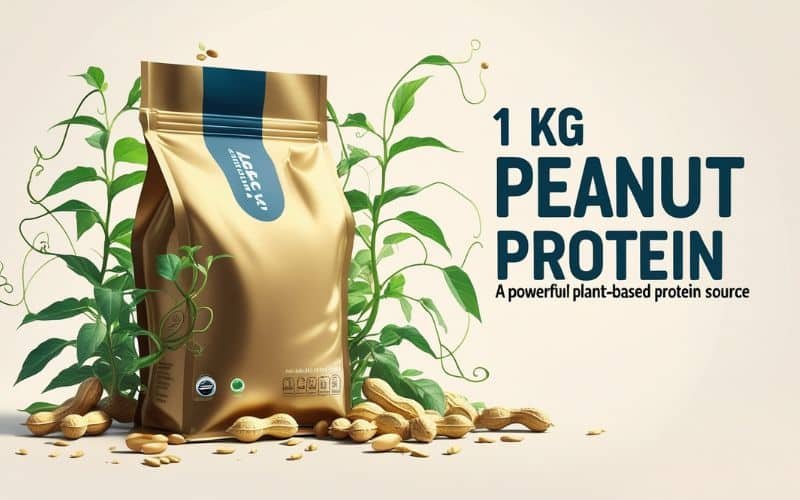Introduction
Peanut protein is a nutrient-dense, plant-based protein derived from peanuts. Unlike whole peanuts, which contain significant fats, peanut protein is processed to remove much of the oil, resulting in a protein-rich powder. This makes it an excellent choice for those seeking a high-protein, plant-based alternative.
Compared to traditional protein sources such as whey or soy, peanut protein offers a unique amino acid profile, particularly rich in arginine, an amino acid crucial for muscle growth and improved blood circulation. Additionally, it contains fiber, essential vitamins, and minerals that support overall well-being.
Why Choose 1 kg Peanut Protein?
Opting for a 1 kg package of peanut protein is ideal for fitness enthusiasts, plant-based eaters, and those who value convenience. Buying in bulk ensures that you always have a high-quality protein source on hand without the need for frequent repurchasing.
From a cost perspective, purchasing a larger quantity often means better value per serving, making it an economical choice. Additionally, peanut protein has a relatively long shelf life when stored in a cool, dry place, ensuring that you get the most out of your investment without worrying about spoilage.
Health Benefits of Peanut Protein
Peanut protein provides a wealth of health advantages beyond just muscle-building:
- Muscle Growth & Recovery: With a solid protein content per serving, peanut protein supports muscle repair, making it an excellent post-workout recovery option.
- Heart Health: Rich in healthy fats and plant sterols, peanut protein can help regulate cholesterol levels, promoting cardiovascular well-being.
- Digestive Health: The fiber content aids digestion and promotes gut health, making it a gentle yet effective option for those with sensitive stomachs.
Unlike some plant-based proteins that may cause bloating, peanut protein is generally well-tolerated and easy to digest.
How to Use Peanut Protein in Your Diet
Peanut protein is incredibly versatile and can be incorporated into a variety of meals:
- Smoothies: Blend it with almond milk, banana, and cocoa powder for a delicious post-workout shake.
- Baking: Add it to pancakes, muffins, or protein bars for a nutrient boost.
- Savory Dishes: Mix it into soups, sauces, or curries to enhance protein content.
For a complete amino acid profile, consider pairing peanut protein with complementary sources like rice protein or hemp protein. The best time to consume it depends on your goals—post-workout for muscle recovery, or in meals throughout the day for sustained energy.
Peanut Protein vs. Other Plant-Based Proteins
While soy and pea proteins dominate the plant-based supplement market, peanut protein holds its own with unique advantages:
- Soy Protein: Complete protein but may cause digestive discomfort and contains phytoestrogens.
- Pea Protein: High in branched-chain amino acids but has a distinct taste some may find unappealing.
- Rice Protein: Easy to digest but lacks certain essential amino acids.
Peanut protein stands out for its rich flavor, balanced nutrition, and digestibility, making it a strong contender among plant-based proteins.
Understanding Supplement Quality and Sourcing
When purchasing peanut protein supplements, consider the following:
- Purity: Look for minimal additives, artificial sweeteners, or unnecessary fillers.
- Processing Method: Cold-pressed or minimally processed peanut protein retains more nutrients.
- Certifications: Non-GMO, organic, and third-party testing ensure a high-quality product.
Since peanut allergies are common, ensure that your peanut protein supplement is manufactured in a facility that adheres to strict allergen control protocols.
Final Thoughts
Peanut protein is a stellar choice for those seeking a plant-based, nutrient-rich protein powder. Whether you’re looking to build muscle, improve overall health, or simply add more protein to your diet, a 1 kg peanut protein supplement is a practical and effective solution. With its rich taste, digestibility, and affordability, it’s a game-changer in the world of plant-based nutrition.










Add comment
You must be logged in to post a comment.